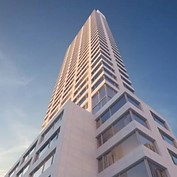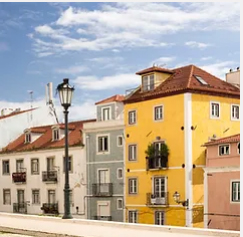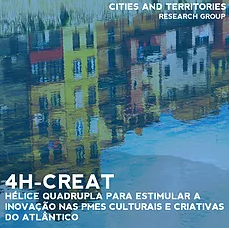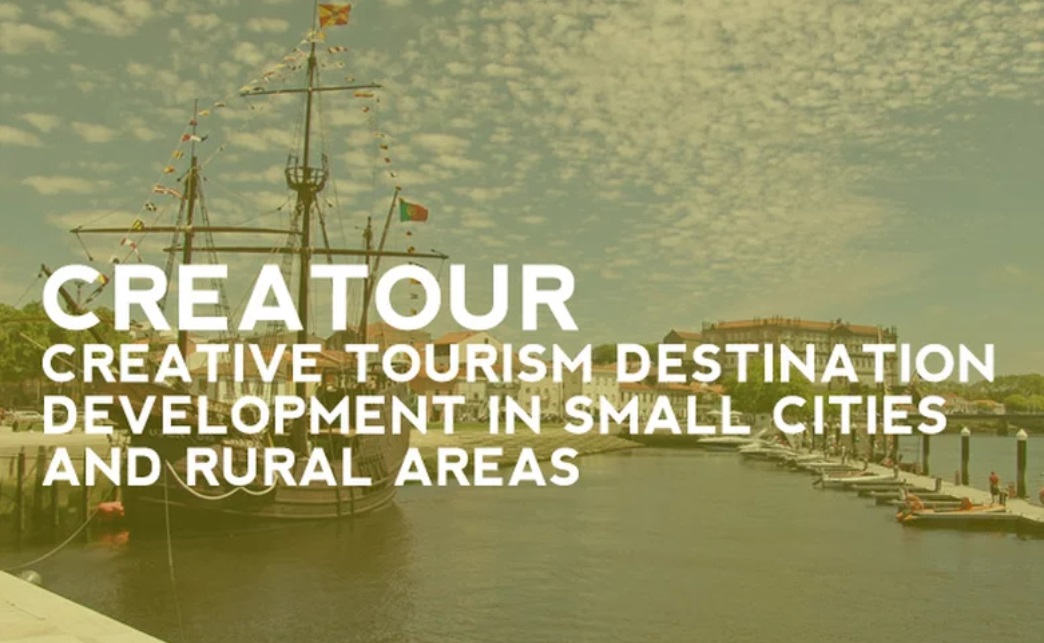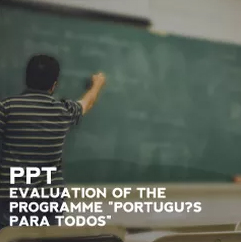Young generations trapped in hybrid lifestyles: Challenges in ways of living and working towards the urban green care in Lisbon and Oslo
Focusing on hybrid trends and models of living (e.g. cohousing and coliving and working flexible and multifunctional spaces), HybGen aims to understand which resilient values and survival strategies young adults (20-35 years old) of Lisbon and Oslo are adopting, and how such strategies intersect with urban green care. The goal is to delve into the hybridity of the new urban lifestyles and the blockages of a generation that, despite being one of the best prepared to face the new challenges of the digital transition, is being sacrificed by the urban economic extractive model. A comparative study will be carried out through participatory action research. This includes fieldwork conducted in both cities; participatory workshops with different stakeholders; a joint seminar to discuss and share findings and good practices; an open-access publication. This bilateral initiative will promote the cooperation, exchange and sharing of knowledge and networking between Portuguese and Norwegian entities, identifying best practices and producing useful policy recommendations for common problems.
Project Information
2024-02-01
2024-12-31
Project Partners
- DINAMIA'CET-Iscte (CT) - Leader
- NULS - (Norway)
Apoio Especial Verão com Ciência - DC 2022
Program and monitoring of scientific and technological research activities for master's students, integrated into the international project “F-Atlas | Franciscan Landscapes” and in “COST ACTION CA18214 - The geography of New Workspaces and the impact on the periphery”.
SUMMER WITH SCIENCE is a special support for scientific and technological research activities in R&D units to boost scientific and technological capacity and its relationship with higher education and society. The program provided for the funding of 11 research initiation grants for a period of one month, with an amount of €5303.32, from funds from the State Budget.
Project Information
2022-07-01
2022-09-30
Project Partners
- DINAMIA'CET-Iscte (CT) - Leader
Álvaro Siza’s collective housing: projects, contexts and experiences (Porto-Lisbon-New York)
The general aim of this project is to study the transformations in Siza’s collective housing over the past 5 decades, focusing on the linked analysis of: a) the projects (social and private housing) and the respective social and urban condition framework; and b) their residents and the relationships they develop with the projected space. The research follows an intensive methodology: comparative study of 3 Siza’s cases/collective housing projects. Each represents a moment on the architect’s professional life and corresponds to a moment in the life of society and the city; the 3 together, and their temporal sequence, represent (part of) Siza’s trajectory and that of contemporary society and of the city. The cases are: 1. Bouça/Porto - started following the 1974 revolution. Symbolising the Revolution, Architecture and the Right to the City when it was in decay; 2. Terraços de Bragança – Chiado, Lisboa, started in the 1990s. Symbolising the national real estate boom, modernization launch and procrastination of urban renaissance; 3. Building 611 West 56th Street – Hell’s Kitchen, New York, began in the 2010s. Symbolising hyper-globalisation, the rise of the city, financialisation of real estate and the incontestability of the value of architectural authorship. The greatest innovation in the proposal is in the temporal sequence of the 3 cases, which allows us to answer the following questions: what has changed in the production and appropriation of Siza’s houses and how do these changes relate to social transformations and the architect’s career? Who promoted the housing at the different times, locations, to what end and for whom? What are the formal, functional and contextual differences/similarities between the projects? How have transformations in the urban context impacted on the occupation of dwelling in social, use and value terms? What is the social profile of residents, their evolution and differences between cases? How do these residents live in Siza’s houses? W...
Project Information
2022-02-01
2024-07-31
Project Partners
- DINAMIA'CET-Iscte (CT) - Leader
- IST - (Portugal)
Project Information
2019-10-26
--
Project Partners
- DINAMIA'CET-Iscte (CT) - Leader
The Geography of New Working Spaces and the Impact on the Periphery
The aim of the COST Action is threefold. First, it aims to share the first outcomes of some funded international research projects on the phenomenon of new workplaces, such as Coworking Spaces and Maker Spaces, in order to: (i) identify the typologies (Taxonomy) of such emerging workplaces, and (ii) reveal their spatial distribution, and to explain their location patterns. Secondly, through the comparison and dissemination of the first results of these international research activities, the Action aims at identifying, measuring and evaluating the (direct and indirect) effects of these new working spaces (Atlas) in order to understand whether and how they have promoted – with or without the help of public subsidies and planning measures : (a) regional competitiveness, economic performance and resilience; (b) entrepreneurial milieu; (c) knowledge creation within regional innovation system, retaining knowledge workers and the creative class; (d) social inclusion and spatial regeneration of peripheral areas. The third aim is to collect, discuss and develop guidelines for tailored policy and planning measures (Tool Box) to foster the positive effects of new workplaces through the promotion of agreements and cooperation with local, regional and/or national public administrations/stakeholders, as well as to try to mitigate their negative effects on the neighbourhoods (i.e. parking shortages, noise, or increasing land rent).
Project Information
2019-10-01
2024-03-30
Project Partners
Maria Assunção Gato - 'Norma Transitória' Individual Project
Project Information
2018-11-01
2024-10-31
Project Partners
- DINAMIA'CET-Iscte (CT) - Leader
Arte Pública e Participação Cidadã - Um Monumento para o Lousal
Patrocinado pelo Município de Grândola, o projecto de investigação-acção “Um Monumento para o Lousal” visa homenagear esta comunidade, investindo na valorização identitária do seu território através da Arte Pública. Trata-se de um processo de co-produção artística desenvolvido ao longo de várias sessões de trabalho entre uma equipa interdisciplinar de investigadores e a comunidade local, com o objectivo de projectar em conjunto e de raiz, três esculturas para a aldeia. Neste contexto, a Arte Pública assume-se não só como ferramenta de diálogo com o território e as memórias colectivas, mas também como elemento de valorização de um património material e imaterial identificador do Ser e do Saber Fazer das gentes do Lousal. Em 2018 concluiu-se o processo criativo que conduziu à elaboração de várias propostas escultóricas, sujeitas posteriormente à votação. Serão construídos e instalados de forma faseada os três projectos mais votados (1º em Maio 2019 e 3º em 2021).
Project Information
2018-10-01
2021-12-31
Project Partners
Quadruple helix to stimulate innovation in the Atlantic Cultural and Creative SMEs
The overall objective of the European project 4H-CREAT is to improve cooperation between public, private and research and development (R&D) actors in order to foster innovation, capacity building and innovation knowledge in the cultural and creative small and medium-sized enterprises (SMEs). Specifically, the project will develop several activities, including a transnational knowledge transfer model, to facilitate the application of R&D results to SMEs in the cultural and creative industries, thus promoting innovation through the collaborative paradigm of the four-helix, which involves the participation of end users through co-creation and co-design processes.
Co-financed by the European Regional Development Fund (ERDF), through the INTERREG Atlantic Area Cooperation Program 2014-2020, and with a total budget of € 1,749,825, the 4H-CREAT project has an European partnership consisting of seven institutions: Glasgow Caledonian University (Parceiro líder), ISCTE – Instituto Universitário de Lisboa (DINÂMIA’CET), Cámara Oficial de Comercio, Industria y Navegación de Sevilla, Etablissement Public d’Aménagement Bordeaux - Euratlantique, Laval Mayenne Technopole, Limerick Institute of Technology, and Fundación Municipal de Cultura del Ayuntamiento de Avilés.
Project Information
2017-05-31
2020-09-30
Project Partners
- DINAMIA'CET-Iscte (IL)
- Official Chamber of Commerce, Industry and Shipping of Seville - (United Kingdom)
- Limerick Institute of Technology - (Ireland)
- Public Development establishment Bordeaux - (France)
- Municipal Foundation of Culture of the City of Aviles - (Spain)
Creative Tourism Development in Small Cities and Rural Areas
CREATOUR is an incubator/demonstration and multidisciplinary research initiative, supporting collaborative research processes. The three-year project aims to connect the cultural/creative and tourism sectors through the development of an integrated research and application approach to catalyzing creative tourism in small cities and rural areas throughout Portugal.Creative tourism involves active learning experiences enabling self-expression and creative skill development, with a more extensive relationship between tourism and creative industries emerging, and with platforms making the distribution of this content possible. An essential feature in this process is the firm link of creativity to place and its embeddedness in the local milieu, promoting the visitor an immersion experience within the local culture and local institutions and generating economic and social added value to the region.
Project Information
2016-11-01
2020-04-30
Project Partners
- DINAMIA'CET-Iscte (CT)
- UAlg - (Portugal)
- UEvora - (Portugal)
- UM - (Portugal)
Evaluation of the Programme "Português Para Todos"
Project goals:Setting up of a technical evaluation plan for the Português Para Todos (PPT – Portuguese for All) Programme, its goals and execution monitoring, in order to produce a characterization and comprehensive interpretation system of PPT. Along with this analysis, the complexity of this venture dictates the systematization of possible findings based on existing monitoring systems, the creation of supplementary data collection instruments that widen available interpretation mechanisms.
Methodology:PPT Programme evaluation will be performed based on a comprehensive multi-method project specifically designed to gather relevant information to the analysis of different levels that determine the Programme’s course:
• Monitoring system/ database analysis
• Interviews
• Survey
• Case studies
• Focus group sessions
• SWOT analysis.
Project Information
2013-11-01
2015-07-31
Project Partners

 Português
Português
